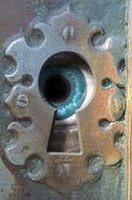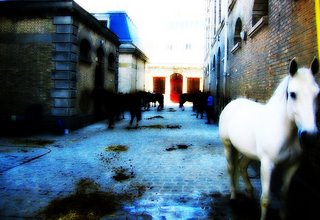15. Confirming the Departure
 I’ll tell you right up front: Mario has counseled against writing what I am about to write.
I’ll tell you right up front: Mario has counseled against writing what I am about to write.“Too raw,” he says.
It is a delicate topic. And like so many of the things I had to do and he had to do in connection with death and illness, I wish the experience on no one.
Gregory’s mother, you see, his next of kin, was still in the hospital, recovering from hip surgery when Gregory died. The hospital chaplain had told her about the death of her only son, who was the only remaining member of her immediate family. Gregory’s father had died years earlier, which had prompted Gregory to come home to sort out his affairs. And Gregory’s brother had committed suicide in the garage of the family home when the young man was 21.
 The uncles and aunts on both sides had all passed. There simply was no other close family till you got to the cousins. So I had gone to the funeral home to start making “the arrangements.” But as awful as this was – making funeral arrangements for the man I loved not a week after last seeing him alive – this isn’t the thing Mario suggested I not write.
The uncles and aunts on both sides had all passed. There simply was no other close family till you got to the cousins. So I had gone to the funeral home to start making “the arrangements.” But as awful as this was – making funeral arrangements for the man I loved not a week after last seeing him alive – this isn’t the thing Mario suggested I not write.Making the arrangements was traumatic enough. But while I was at the funeral home the first time, I was asked to identify Gregory’s body.
You’ve seen this dramatic moment enacted on any number of TV shows. The parent asked to identify the child. The friend of the family asked to identify someone’s wife. The medical examiner or an assistant pulling back the sheet from his or her face, and the one making the identification either grimacing – yes, this is the person – or exhibiting this mosaic of positive and negative facial gestures – no! It’s not the person!
 That’s not how it happened for me. For one thing, Gregory was already at the funeral home, so I wasn’t in the stainless-steel-and-tile environs of the morgue. I tried to prepare myself emotionally for what was about to happen. But nothing prepares you. Just as nothing prepares you to hear the stunning news that someone you love has died. Nothing prepares you to look upon the body the first time.
That’s not how it happened for me. For one thing, Gregory was already at the funeral home, so I wasn’t in the stainless-steel-and-tile environs of the morgue. I tried to prepare myself emotionally for what was about to happen. But nothing prepares you. Just as nothing prepares you to hear the stunning news that someone you love has died. Nothing prepares you to look upon the body the first time.I was escorted to a private viewing room by a funeral director dressed in a tailored suit and “sensible” shoes – quite incongruous, given her youth and demeanor. She looked like she’d be more at home in a bar with friends, sipping margaritas. This was a uniform, as surely as a waitress’ outfit at Denny’s.
As we crossed the large, common anteroom, she showed me the death certificate. I was shocked to see the cause of death in black and white for the first time: cardioatherosclerotic disease. The poster child for health and fitness had died of a massive heart attack. Then I pointed out to the funeral director
 that Gregory was not “Pakistani” as the medical examiner had written.
that Gregory was not “Pakistani” as the medical examiner had written.She pushed open the door to the viewing room, and I got my first glimpse of the body, swathed in sheets and strapped to a gurney, like a newborn. For just a flash, I had the wild thought that maybe it wouldn’t be him. Maybe it was a real Pakistani, and this would have all been a terrible misunderstanding.
My heart sank as the familiar profile came into view. I stood looking at him – eyes closed, face unshaven, skin flat and waxy – digesting the moment.
Without a doubt, it was one of the most wrenching experiences of my life. Here was visual confirmation of what I had already been told. But the mind is a cunning protector. If you haven’t actually seen the person who has died, some part of you, even if it’s just one teensy corner that you didn’t even know existed, holds out hope that the news will be wrong.
For me, it turned on the word, “Pakistani.” This was a far-fetched and ignorant description of Gregory’s ethnicity. And so there was that brief moment of hope leaping like a solar flare.
 But it was true. This indeed was Gregory. And I could feel sweet, protective shock again licking at the edges of my mind.
But it was true. This indeed was Gregory. And I could feel sweet, protective shock again licking at the edges of my mind.As for Mario’s admonition not to relay this experience, I wonder. Is he right? Or does this serve to bring the truth of death a little closer to reality in a society that keeps it locked up tight behind the doors of denial?
In every relationship, one of you will leave, or be left – unless it’s like The Unbeaerable Lightness of Being or Thelma and Louise – because none of us gets out of this alive.

 In the months before Gregory’ death, I allowed myself a small luxury. Every so often a feeling would come over me unbidden. Perhaps I would be driving up to a stoplight with the window down, wrapped in the strains of some lovely piece like Pacobel’s Canon or Barber’s Adagio for Strings. I’d feel the sun prickling my arm as I slowed to stop, drinking in the beauty of the sky, unfolding in what seemed to be a limitless vista.
In the months before Gregory’ death, I allowed myself a small luxury. Every so often a feeling would come over me unbidden. Perhaps I would be driving up to a stoplight with the window down, wrapped in the strains of some lovely piece like Pacobel’s Canon or Barber’s Adagio for Strings. I’d feel the sun prickling my arm as I slowed to stop, drinking in the beauty of the sky, unfolding in what seemed to be a limitless vista.
 I, too, was so in love with Gregory. As Mario was so in love with Izzy. We opened our hearts and our souls, we loved greatly and were hurt mightily.
I, too, was so in love with Gregory. As Mario was so in love with Izzy. We opened our hearts and our souls, we loved greatly and were hurt mightily.






 After Gregory died, the police could not locate his next of kin from the clues inside his condominium. They talked to Gregory’s landlord, but this was no help. In desperation, they began showing Gregory’s picture around our complex, and a friend of mine recognized him. Darlene told them I was his girlfriend.
After Gregory died, the police could not locate his next of kin from the clues inside his condominium. They talked to Gregory’s landlord, but this was no help. In desperation, they began showing Gregory’s picture around our complex, and a friend of mine recognized him. Darlene told them I was his girlfriend.


 All the years of preparing her to be competent and independent coalesced in that moment. Helena didn’t break down. She didn’t cry. Not then. She held like a rock long enough to tell them how to find Gregory’s mother – where she lived and that she was in the hospital for a hip replacement. Helena didn’t know which hospital, but it was a solid lead. It got them started.
All the years of preparing her to be competent and independent coalesced in that moment. Helena didn’t break down. She didn’t cry. Not then. She held like a rock long enough to tell them how to find Gregory’s mother – where she lived and that she was in the hospital for a hip replacement. Helena didn’t know which hospital, but it was a solid lead. It got them started.

